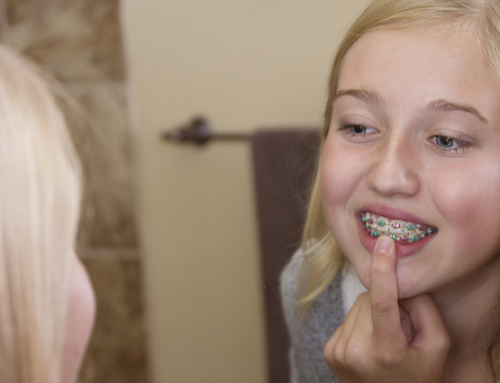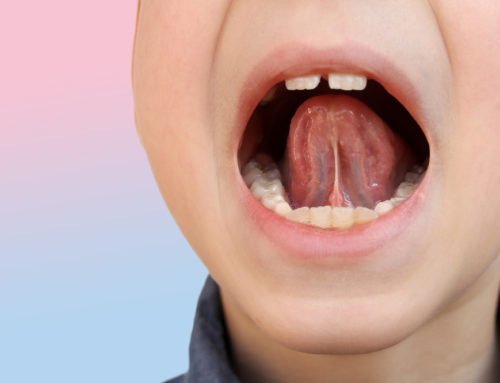What You Need to Know About Your Child’s Cavity
Cavities are a common problem for adults and kids alike. However, baby teeth are especially susceptible to cavities. Recent stats show that cavities are the number one chronic childhood disease, with over 40% of children aged two to 11 developing a cavity in their baby teeth.
The primary reason cavities affect children more frequently than adults is because the shape and structure of a child’s tooth differ from that of an adult’s. The center of the tooth contains nerves that support blood supply, but in children, these nerves are closer to the tooth’s surface. Another reason cavities are more common in kids is that their teeth enamel is thinner than an adult tooth, making it easier for bacteria to break through.
You might think your child will eventually lose these teeth anyway, so what does it matter? But you shouldn’t ignore it if your child has a cavity. By understanding the basics of cavities and taking steps to protect your child’s teeth, you can help ensure they have a healthy smile for years to come.
Why Taking Good Care of Baby Teeth is Important
Baby teeth eventually fall out and are replaced with permanent adult teeth, so we understand why many parents assume it’s not a big deal if their child develops a cavity.
But there are many reasons why taking care of your child’s baby teeth is important.
- Decayed baby teeth will either need to be filled or taken out by the dentist. This can be frightening for your child and stressful and costly for you as a parent.
- Missing baby teeth can cause nearby teeth to shift around. This can keep your child’s permanent teeth from coming in correctly, which might mean braces later in life.
- Healthy teeth are required to chew food thoroughly, which nourishes our bodies for overall good health and helps aid in healthy digestion.
- Your child needs their baby teeth to speak clearly.
- Teaching your child the importance of good oral hygiene creates healthy habits that help prevent tooth decay now and in the future.
Yes, baby teeth eventually fall out. Still, they are essential to your child’s immediate and long-term health, development and self-esteem and set the stage for a lifetime of good dental health. Your child’s baby teeth should be cared for and preserved until they’re ready to fall out naturally.
What is a Cavity?
A cavity is a hole in the tooth that comes about when oral bacteria get the upper hand causing teeth to produce excess acid that weakens the tooth enamel.
Here is an analogy to help you understand…
We all have bacteria in our mouths; this is normal. These oral bacteria primarily eat sugar, the same sugars we eat. Just like we produce a waste product in our intestines when we eat sugars (that is eventually flushed down the toilet), the bacteria in the mouth also produce a waste product. Essentially, oral bacteria “go to the bathroom” on our teeth after we eat sugar, creating excess acid and a sticky film of bacteria that forms on teeth called plaque.
In other words, that acid eats away at our teeth until the bacteria make their way inside the tooth and eventually into the part where the blood vessels and nerves are found…also known as the pulp. This is when teeth begin to get infected and become painful, resulting in a cavity in your child’s tooth.
Again, this bacteria is normal; we all have it. It becomes a problem (that results in a cavity) if it takes over.
Why Do You Need to Treat a Cavity in Children?
Treating cavities in children is necessary for multiple reasons. Of course, you don’t want your child to be in pain, but many other compilations could arise if you leave tooth decay and a cavity untreated.
For one, it helps to avoid the spread of oral infections, which result in more tooth decay.
Second, a cavity in teeth might also negatively affect the formation of permanent teeth. But it doesn’t only affect proper tooth development; it can also contribute to an improper jaw structure.
Furthermore, a cavity can impact a child’s nutrition if left untreated as they chew food with the infected teeth.
Signs Your Child Might Have a Cavity
If your child is complaining of a toothache and it has persisted for several days, this is the leading indicator your child might have a cavity. But if your child can’t speak, they can’t tell you where they hurt, which means you need to watch for other signs and symptoms that a cavity is forming.
Even if your child can communicate they are in pain, cavities don’t always cause discomfort, making recognizing your child has a cavity challenging at any age.
Here are other common indications that your little one is suffering from tooth decay and a cavity is emerging.
- Your child complains that their teeth hurt when they bite into something hard or sweet.
- You notice your child seems sensitive to drinking or eating anything that is hot or cold.
- If your child can’t speak, take notice if they are eating less food than usual. This often indicates that it hurts when they chew, or their mouth feels sensitive.
- Your child seems to experience difficulty opening their mouth wide.
- You see visible white or brown spots or stains on the surface of the teeth.
- Holes, cracks, chips or “pits” in the tooth.
Once you identify your child has signs of a cavity, your next step should be to schedule an appointment with a pediatric dentist for an adequate treatment plan.
What is the Most Common Cause of Cavities in Children?
Babies that fall asleep with a milk bottle in their mouth are at the highest risk for tooth decay because baby formula or breast milk both contain natural sugars that can kick-start the process of tooth decay.
Another common cause of cavities and tooth decay in young children is consuming excessive amounts of sugary foods and beverages. Oral bacterias feed on excess sugar and carbohydrates. When these sugars stay on the teeth for a prolonged period, it starts contributing to bacterial growth, which later leads to plaque buildup.
Sugar isn’t the only way plaque can build up on your child’s teeth. Several factors, alone or combined, can increase your child’s risk for cavities, including:
- Poor Oral Hygiene: Similarly to an adult, excess plaque can build up if your child is not brushing and flossing regularly and not having their teeth professionally cleaned every six months.
- Saliva Transmission: Another person’s saliva can overexpose your child to the acid-producing oral bacteria that cause cavities.
- Bedtime Drinks: Giving your child sweetened liquids like juice before a nap or bedtime without brushing afterward is a bad idea because salivation slows during sleep. Without saliva to remove sweetened liquids from your child’s teeth, oral bacteria have a longer time to feed on leftover sugars on and around your child’s teeth.
- Dry Mouth: The primary function of saliva is to help wash away any food debris left in your mouth. When the mouth is dry, this process is disrupted. Saliva also contains elements that neutralize plaque acidity and helps rebuild and restore tooth enamel.
How to Prevent Cavities in Kids
The best way to treat childhood cavities is to prevent them from happening in the first place.
Believe it or not, your child’s first dental visit should come shortly after they turn one or when you see their first tooth appear. By taking your child to a dentist at a young age, you’ll be able to detect problems at an early stage before it turns into something more severe.
Here is a quick guide for parents regarding cavity prevention in your child’s teeth:
- Schedule appointments with a pediatric dentist every six months for a professional teeth cleaning, exam and x-rays to detect cavities.
- Make it a habit for your child to brush twice daily for no less than two minutes and floss once daily.
- Teach your child gentle brushing and flossing techniques to prevent gums from bleeding.
- Limit consumption of sugary foods and beverages.
- Ask your dentist about sealants. Sealants are a protective coating that is painted on teeth to seal them, keeping bacteria out.
- Consider fluoride treatments. Most kids get the fluoride they need from tap water and toothpaste. However, your pediatric dentist can also apply a fluoride varnish to your child’s teeth 2-4 times a year.
How are Child Cavities Treated?
Because of the differences in a child’s tooth compared to an adult, they might have to undergo a slightly different type of dental procedure when they have a cavity. Your pediatric dentist will suggest the best and least invasive cavity treatment for your child, depending on your child’s age and the size of the cavity.
Here are a few of the most common cavity treatments for children:
- Filling: It can sometimes get complicated to treat cavities in children with a filling since the shape of their tooth isn’t always suitable for large fillings. If the cavity is small, the dentist should be able to remove the decay, fill the cavity with a white composite or metal material and preserve the tooth.
- Crown: If a dentist identifies that the cavity is touching both sides of your child’s tooth or that the cavity is very large, they may recommend placing a silver crown on a tooth rather than a filing.
- Extraction: Sometimes, if the tooth is badly damaged or has an infection, the baby tooth may need to be removed. If your dentist removes the tooth, they’ll keep the gap open with a space maintainer, which helps permanent teeth grow in properly.
How To Make Cavity Filling More Comfortable for Your Child
Oral problems are daunting at any age, but they can be especially frustrating for children. And when your child is uncomfortable, it can also put parents under a lot of stress!
Here at Snodgrass-King, our expertise is pediatric dentistry. We create a relaxing and fun environment where your kids can play in our play areas while they wait. And during their appointment, they can enjoy our overhead TVs while leaning back in the dental chair.
A lot of kids have a fear of the dentist that can be made worse when your child has a cavity. We built our pediatric dentistry offices to be stress-free environments for you and your children.
Book Your Appointment with a Dentist in Middle Tennessee
Sometimes, your child may still develop a cavity despite your best efforts. Snodgrass-King specializes in pediatric dentistry.
If your child starts complaining about sudden toothaches or you notice any of the other abovementioned symptoms that your child might have a cavity, make sure to schedule an appointment with a pediatric dentist at Snodgrass and King Dentistry without delay.
We have several offices in Middle Tennessee– Mt. Juliet, Murfreesboro, Spring Hill, Franklin and Cool Springs.






